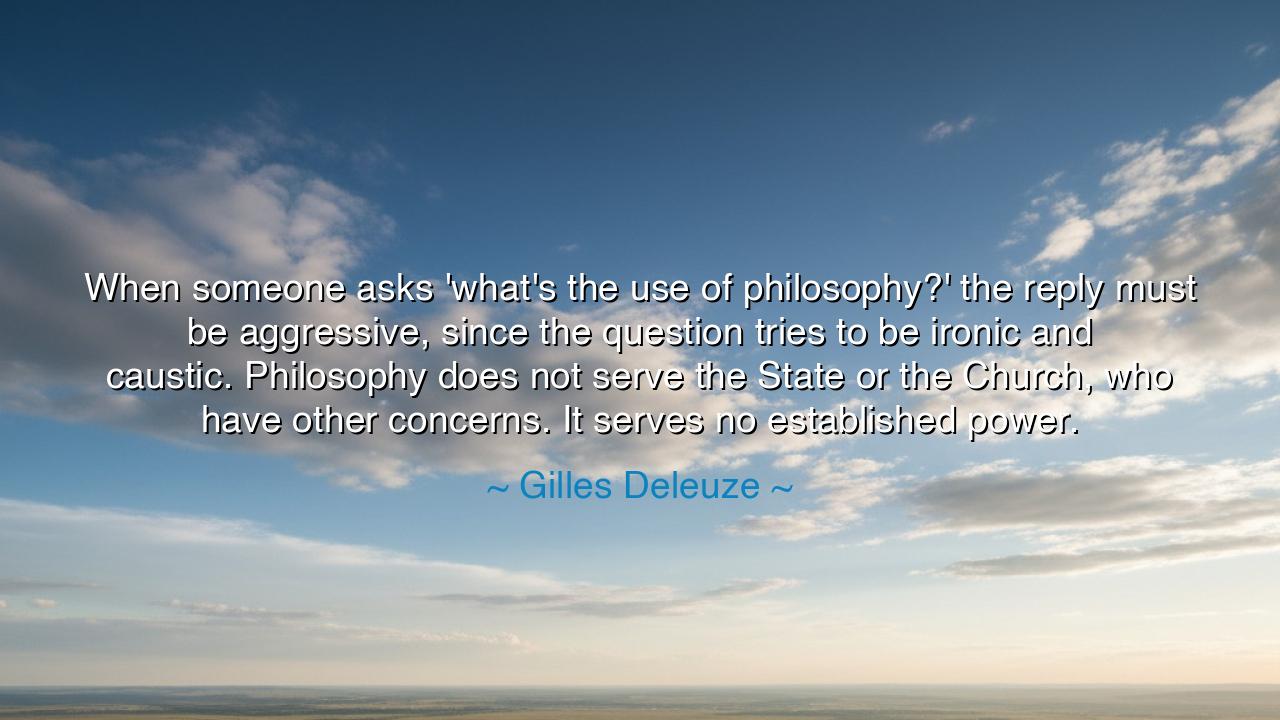
When someone asks 'what's the use of philosophy?' the reply must
When someone asks 'what's the use of philosophy?' the reply must be aggressive, since the question tries to be ironic and caustic. Philosophy does not serve the State or the Church, who have other concerns. It serves no established power.






Gilles Deleuze, philosopher of daring thought, speaks with fire when he declares: “When someone asks ‘what’s the use of philosophy?’ the reply must be aggressive…” For such a question, he says, is not asked in innocence, but with scorn, to belittle the discipline that seeks truth beyond utility. His answer is thunderous: philosophy does not serve the State, nor the Church, nor any seat of established power. It serves instead the freedom of the mind, the widening of the horizon, the breaking open of possibility.
The ancients themselves lived this defiance. Socrates, questioned by his city for the “use” of his relentless inquiry, refused to flatter the State with servile answers. His philosophy exposed hypocrisy, awakened the conscience, and for this he drank the hemlock. His life shows what Deleuze proclaims: philosophy is not for power, but for truth, and truth often unsettles the mighty.
History resounds with other voices silenced for the same reason. Galileo, gazing through his telescope, revealed truths that contradicted the doctrines of the Church. When asked what use his knowledge was, he replied with evidence, not submission. He was condemned, yet his vision endured, liberating the human spirit from the narrow cage of ignorance. His defiance testifies to Deleuze’s claim: philosophy does not bend the knee to throne or altar.
Yet Deleuze’s words also carry a warning. Those who ask “what’s the use?” of philosophy demand that every pursuit be measured by its service to existing structures. But philosophy’s power lies precisely in its refusal to serve as a tool of domination. It questions, it dismantles, it liberates. Its use is that it resists being useful in the sense of profit or propaganda; it is the breath of freedom that power cannot chain.
Let this be handed down: philosophy is the sharp edge of the mind, the guardian of liberty, the fire that burns illusions. It is not servant to kings or priests, but a companion of truth-seekers across the ages. When mocked for its seeming impracticality, let the reply be fierce, for the question itself is blind. The use of philosophy is that it dares to stand against all established powers and declares: thought is free, and in that freedom lies the seed of every revolution of the human soul.






NPNguyen Phap
This statement raises questions about the relationship between thought and power. If philosophy is not meant to serve existing structures, does it function as a form of critique or liberation? I’m curious whether this means philosophy is inherently confrontational, or whether it can exist quietly without being absorbed by dominant systems. Could this also suggest that the worth of philosophy lies in fostering critical awareness, creativity, and reflection, rather than providing direct solutions or aligning with institutional goals? How do we cultivate this kind of autonomous thinking in education and public discourse?
PMpham mai
I find this perspective provocative because it frames philosophy as oppositional rather than supportive of authority. Could the ‘aggressive’ reply that Deleuze advocates be necessary to assert the autonomy of thought? I wonder how this view applies to contemporary contexts, like political or corporate environments, where ideas are often co-opted for strategic purposes. Does philosophy lose its essence when used instrumentally, or can it maintain independence even while influencing policy or social movements? How do we distinguish authentic philosophical inquiry from mere service to power?
TLThanh Luong
Reading this, I’m struck by the idea that philosophy does not have practical utility in the sense that the State or Church demands. Does this imply that its value is purely intellectual, or is there a broader social or moral significance that escapes immediate measurement? I’m curious how one can defend philosophy against accusations of uselessness in a world that prioritizes productivity and tangible outcomes. Could this defense require embracing philosophy’s disruptive and independent nature rather than trying to justify it in conventional terms?
DTNguyen Dinh Thanh
This quote makes me reflect on the role of philosophy in society. If it serves no established power, does that mean its primary purpose is to challenge authority and provoke critical thinking? I wonder whether philosophy is inherently subversive, or if it can coexist with institutions without losing its independence. Could Deleuze be suggesting that true philosophical inquiry must resist utilitarian expectations, focusing instead on questioning assumptions and exploring possibilities beyond conventional structures?